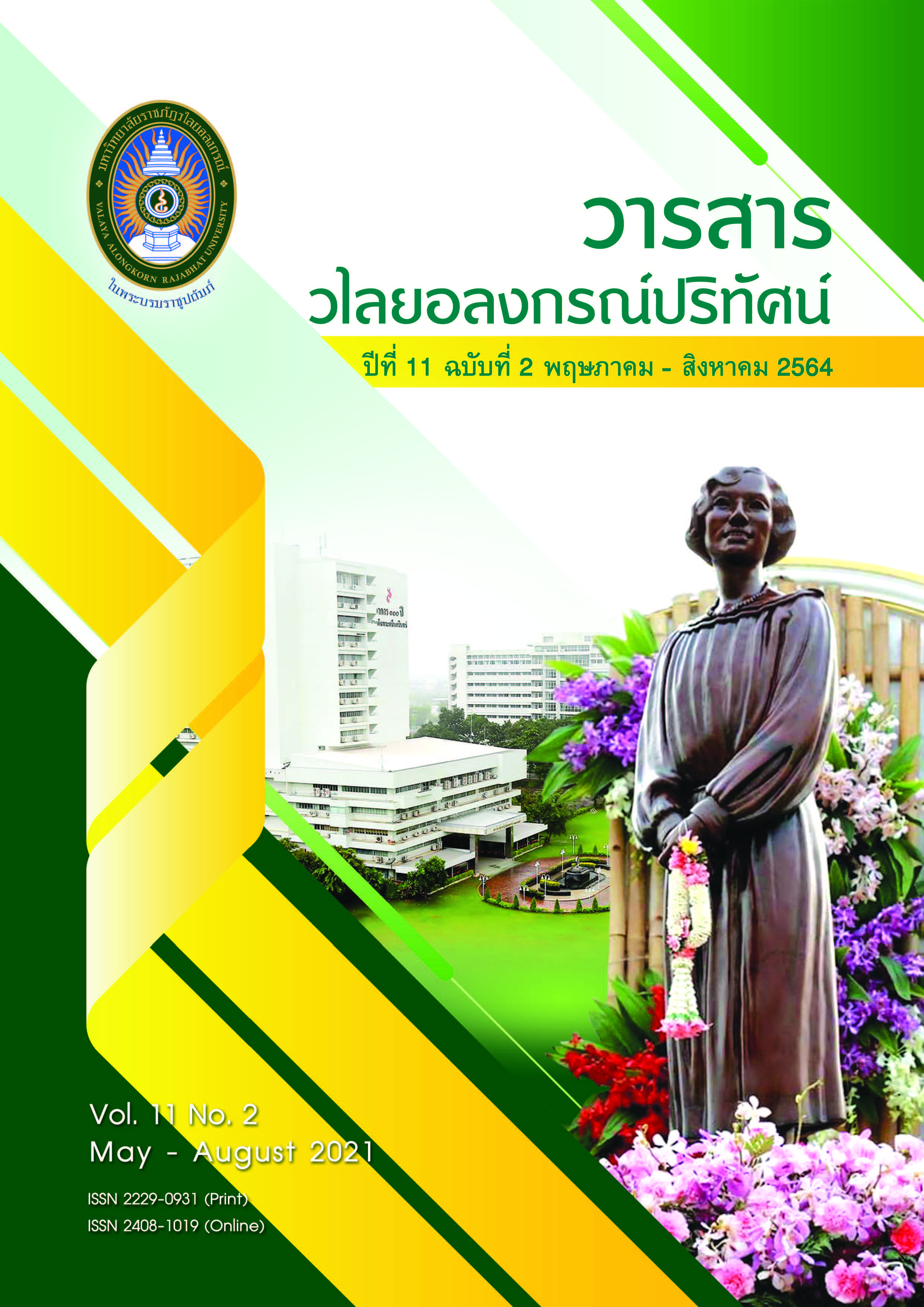การศึกษาทัศนคติของนักศึกษาครูภาษาอังกฤษที่มีต่อการสอนภาษาแบบสื่อสารในรายวิชากิจกรรมสำหรับการสอนภาษาอังกฤษ
คำสำคัญ:
ทัศนคติ, การสอนภาษาอังกฤษแบบสื่อสาร, นักศึกษาฝึกปฏิบัติการสอนบทคัดย่อ
การวิจัยครั้งนี้มีวัตถุประสงค์เพื่อ 1) ศึกษาทัศนคติที่มีต่อการสอนภาษาอังกฤษแบบสื่อสารของนักศึกษา และ 2) เปรียบเทียบทัศนคติที่มีต่อการสอนภาษาแบบสื่อสารระหว่างนักศึกษาชาย และนักศึกษาหญิง กลุ่มตัวอย่างการวิจัย จำนวน 44 คน เป็นนักศึกษาชั้นปีที่ 4 สาขาวิชาภาษาอังกฤษ คณะครุศาสตร์ มหาวิทยาลัยราชภัฏวไลยอลงกรณ์ ในพระบรมราชูปถัมภ์ จังหวัดปทุมธานี ที่เรียนรายวิชากิจกรรมสำหรับการสอนภาษาอังกฤษ ในภาคเรียนที่ 1 ปีการศึกษา 2563 เครื่องมือที่ใช้ ในการวิจัย ได้แก่ 1) แบบสอบถามทัศนคติต่อการสอนภาษาแบบสื่อสาร 2) แบบสัมภาษณ์ กึ่งโครงสร้าง และ 3) แบบสังเกตพฤติกรรมการจัดกิจกรรมการเรียนรู้ ข้อมูลเชิงปริมาณนำมารวบรวมและวิเคราะห์ โดยใช้สถิติเชิงพรรณนา ได้แก่ การแจกแจงความถี่ ร้อยละ ค่าเฉลี่ย ส่วนเบี่ยงเบนมาตรฐาน และการทดสอบ independent t-test ส่วนข้อมูลจากการสัมภาษณ์และสังเกตการณ์ใช้เทคนิคการวิเคราะห์เนื้อหา
ผลการวิจัยพบว่า นักศึกษากลุ่มตัวอย่างมีทัศนคติที่ดีต่อการสอนภาษาอังกฤษแบบสื่อสาร (คะแนนเฉลี่ย 79 คะแนน) และมีทัศนคติเชิงบวกกับแนวคิดการสอนแบบ CLT โดยเฉพาะมีทัศนคติ ที่ดีอย่างยิ่งในด้านการทำงานเป็นกลุ่มของผู้เรียน “ควรให้ผู้เรียนทำงานเป็นกลุ่มเพื่อช่วยให้ผู้เรียนเห็นปัญหาในการเรียนรู้ของตนเอง รู้จักควบคุม จัดการ การทำงานของตนเอง การทำงานเป็นกลุ่ม จึงเป็นวิธีจัดประสบการณ์เรียนรู้ในชั้นเรียน” (ค่าเฉลี่ย 4.57) เมื่อเปรียบเทียบทัศนคติของนักศึกษาชายและนักศึกษาหญิงที่มีต่อการสอนภาษาแบบ CLT พบว่า ไม่แตกต่างกัน ผลจากการวิจัยครั้งนี้ แสดงถึงความรู้ความเข้าใจและทัศนคติของนักศึกษาครูภาษาอังกฤษที่มีต่อแนวคิดการสอนภาษา แบบ CLT ซึ่งเป็นข้อมูลเบื้องต้นแสดงถึงความตระหนักและยอมรับแนวคิดการสอนภาษาที่ส่งผลต่อการตัดสินใจนำไปปฏิบัติใช้จัดการเรียนการสอนในชั้นเรียนจริงของตนเอง และเสนอแนะว่าควรนำทัศนคติและความคิดเห็นของนักศึกษาครูต่อแนวคิดการสอนภาษาไปใช้ออกแบบและพัฒนาหลักสูตรเพื่อเพิ่มสมรรถนะวิชาชีพ ส่งเสริมการบ่มเพะนักศึกษาให้เป็นครูสอนภาษาอังกฤษมืออาชีพต่อไป
เอกสารอ้างอิง
Brown, H. D. (2007). Principles of Language Learning and Teaching. Pearson Longman. San Francisco State University.
Chang, M. (2011). Factors Affecting the Implementation of Communicative Language Teaching in Taiwanese College English Classes. English Language Teaching. 4(2): 3-12.
Huang, S. (2016). Communicative Language Teaching: Practical Difficulties in the Rural EFL Classrooms in Taiwan. Journal of Education and Practice. 7(24): 186-202.
Hymes, D. H. (1979). On Communicative Competence in Brumfit, C. and Johnson, K. (eds). The Communicative Approach to Language Teaching. Oxford University Press.
Karavas-Doukas, E. (1996). Using Attitude Scales to Investigate Teachers’ Attitudes to the Communicative Approach. ELT Journal. 50(3): 187-196.
Khunbankong, S. & Abhakorn, J. (2016). Teachers’ and Students’ Attitudes and Perceptions on the Applicability of CLT in the Thai Classroom Context. Journal of Humanities, Naresuan University. 13(3): 35-52.
Kwon, Y. (2017). A Study of Thai Teachers’ Perceptions toward the Implementation of Communicative Language Teaching of English. HRD Journal. 8(1): 114-125.
Lashgari, M., Jamali, F., & Yousofi, N. (2014). Investigating EFL Teachers’ Attitudes towards CLT. International Journal of Basic Sciences and Applied Research. 3(3): 160-164.
Ozsevik, Z. (2010). The Use of Communicative Language Teaching (CLT): Turkish EFL Teachers’ perceived Difficulties in Implementing CLT in Turkey. MA Thesis Submitted at University of Illinois at Urbana-Champaign, [Online], Available: https://www.ideals.illinois.edu/handle/2142/16211 (2020, 16 August).
Richards, J. C. (2006). Communicative Language Teaching Today. SEAMEO. Regional Language Center.
Zulu, M. P. (2019). Teachers’ Understanding and Attitudes towards Communicative Language Teaching Method in ESL Classrooms of Zambia. International Journal of Humanities, Social Sciences and Education. 6(6): 1-13.
ดาวน์โหลด
เผยแพร่แล้ว
รูปแบบการอ้างอิง
ฉบับ
ประเภทบทความ
สัญญาอนุญาต
ข้อความที่ปรากฏในบทความแต่ละเรื่องในวารสารวไลยอลงกรณ์ปริทัศน์ เป็นความคิดเห็นของผู้นิพนธ์แต่ละท่าน มิใช่เป็นทัศนะและมิใช่ความรับผิดชอบของกองบรรณาธิการจัดทำวารสาร และ
มหาวิทยาลัยราชภัฏวไลยอลงกรณ์ ในพระบรมราชูปถัมภ์


